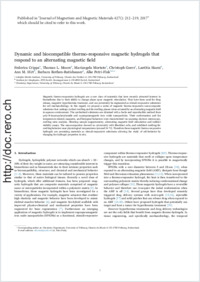Dynamic and biocompatible thermo-responsive magnetic hydrogels that respond to an alternating magnetic field
- Crippa, Federica Adolphe Merkle Institute, University of Fribourg, Switzerland
- Moore, Thomas L. Adolphe Merkle Institute, University of Fribourg, Switzerland
- Mortato, Mariangela Adolphe Merkle Institute, University of Fribourg, Switzerland
- Geers, Christoph Adolphe Merkle Institute, University of Fribourg, Switzerland
- Haeni, Laetitia Adolphe Merkle Institute, University of Fribourg, Switzerland
- Hirt, Ann M. Institute for Geophysics, ETH Zurich, Switzerland
- Rothen-Rutishauser, Barbara Adolphe Merkle Institute, University of Fribourg, Switzerland
- Petri-Fink, Alke Adolphe Merkle Institute, University of Fribourg, Switzerland - Chemistry Department, University of Fribourg, Switzerland
-
01.04.2017
Published in:
- Journal of Magnetism and Magnetic Materials. - 2017, vol. 427, p. 212–219
English
Magnetic thermo-responsive hydrogels are a new class of materials that have recently attracted interest in biomedicine due to their ability to change phase upon magnetic stimulation. They have been used for drug release, magnetic hyperthermia treatment, and can potentially be engineered as stimuli-responsive substrates for cell mechanobiology. In this regard, we propose a series of magnetic thermo-responsive nanocomposite substrates that undergo cyclical swelling and de-swelling phases when actuated by an alternating magnetic field in aqueous environment. The synthetized substrates are obtained with a facile and reproducible method from poly-N- isopropylacrylamide and superparamagnetic iron oxide nanoparticles. Their conformation and the temperature-related, magnetic, and biological behaviors were characterized via scanning electron microscopy, swelling ratio analysis, vibrating sample magnetometry, alternating magnetic field stimulation and indirect viability assays. The nanocomposites showed no cytotoxicity with fibroblast cells, and exhibited swelling/de-swelling behavior near physiological temperatures (around 34 °C). Therefore these magnetic thermo-responsive hydrogels are promising materials as stimuli-responsive substrates allowing the study of cell-behavior by changing the hydrogel properties in situ.
- Faculty
- Faculté des sciences et de médecine
- Department
- Département de Chimie
- Language
-
- English
- Classification
- Biological sciences
- License
- License undefined
- Identifiers
-
- RERO DOC 288909
- DOI 10.1016/j.jmmm.2016.11.023
- Persistent URL
- https://folia.unifr.ch/unifr/documents/305445
Statistics
Document views: 95
File downloads:
- fin_dbt.pdf: 161
